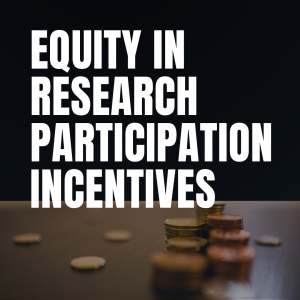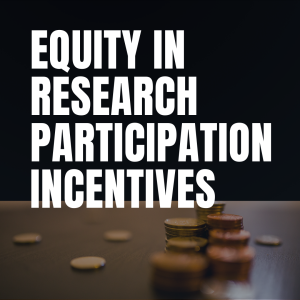Addressing equity in research participation incentives


June 2021
Last month, faculty and research staff from the School of Public Health, IRWG, and other research teams and organizations sent an open letter to the Office of the Vice President for Research with more than 380 signatures to advocate for equity in incentive payments for human research subjects. The university currently offers several options to provide small incentive payments to research participants for their time and participation in the form of a check, Visa gift card, or cash (for research activities conducted in-person); additionally, study teams have the option of providing a digital gift card delivered electronically (often a gift card to Amazon or a retail store).
With the COVID-19 pandemic, many research studies shifted to virtual implementation, mostly eliminating the option to provide cash payments to research participants. Unfortunately, the non-cash options create barriers for economically vulnerable research participants. This especially creates a large barrier to research participation for those who do not have a secure location to receive mail, or are experiencing homelessness or housing instability. “Many of our IRWG affiliated faculty work with Black trans women and other vulnerable populations, who deserve convenient and workable compensation for their research contributions with us and without whom we can't do our best research,” said IRWG director Anna Kirkland.
Laura Jadwin-Cakmak, Research Director for the Resilience + Resistance Collective in the School of Public Health explained, “For me personally, the urgent need for a low-barriers method of providing research participants with an electronic cash transfer became apparent through my work with the Love Her Collective, our community-academic partnership with Trans Sistas of Color Project where we seek to understand and address the needs of transgender women of color in Detroit. Due to systemic intersecting racism and transphobia, transgender women of color experience severe inequities in social determinants of health and many health outcomes. These inequities seen nationally were confirmed locally through our recent IRWG-funded survey with transgender women of color in Detroit, where we found that 66.7% of respondents earn less than $1,000 per month, 78.3% are experiencing food insecurity, 39% are homeless or instably housed, and just 18.3% are able to get by in their current financial situation.”
The COVID-19 pandemic has only exacerbated these issues. As research activities switched to virtual formats, it was no longer possible to provide cash incentives for research participation. “There have been a number of times that women have expressed interest in participating in one of our research studies, but upon learning that they would have to wait for a mailed Visa gift card or check or receive a digital gift card, were not able to participate because they had to prioritize immediate survival needs including food and temporary shelter,” said Jadwin-Cakmak. “In speaking with my colleagues within the Project Directors Group in the Department of Health Behavior & Health Education at the School of Public Health, we realized this was an issue affecting many of our research projects across the university.”
The open letter has been met with a supportive and swift response from University leadership, including acknowledgment of the importance of the topic, and the initiation of a discovery project to investigate various options as quickly as possible. The response is “very encouraging,” said Jadwin-Cakmak, “we are so pleased and appreciative that leadership at UMOR and the Treasury Office have been responsive and are taking action on this issue.”
